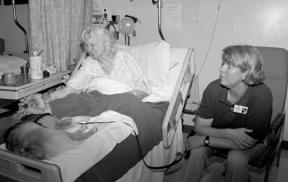Whidbey General Hospital’s newest volunteers don’t fluff pillows or refill water pitchers. Clancy, a small Australian shepherd, with his human partner Joy Thompson, bring patients companionship and conversation.
Clancy and Thompson are Pet Partners with Delta Society, a nonprofit organization dedicated to improving human health through service and therapy animals. The program trains animals and their humans to participate in animal-assisted therapy programs in hospitals, schools, nursing homes and rehabilitation facilities.
More than 6,400 Pet Partners teams operate in all 50 states and four other countries.
On a recent Wednesday, Clancy and Thompson made rounds at the hospital, visiting patients and meeting staff. Every person — patient, nurse, visitor, doctor — who saw Clancy smiled. It would be hard for anyone not to smile at Clancy’s extravagantly splotched coat and laughing face.
“A visit from Clancy makes people happy,” Thompson said.
“Having this guy come see me is the most excitement I’ve had in four days,” Jo Hines, a hospital patient, agreed as she rubbed Clancy’s ears.
In corridors, nurses and volunteers grinned and spoke to Clancy and Thompson.
“He is lifting everyone’s spirits,” said Trish Rose, the hospital’s community relations manager.
For some time, Thompson had been taking her other dog, Molly, to entertain residents at Seattle-area nursing homes. After Clancy strayed into her life, she decided his personality fit the requirements of one-on-one therapy.
“He’s such a sweet, happy guy,” Thompson said. “And he loves people.”
But even sweet dogs must qualify and train to be therapy dogs.
Thompson and Clancy attended workshops and completed a home study program which included an entire manual on health care and safety to be understood. Before becoming certified Pet Partners Thompson took several written tests. Delta Society trainers put Thompson and Clancy through several rigorous practical tests. And Clancy had a thorough veterinary screening.
Now when Thompson dresses Clancy in his hospital collar and Delta Society vest, Clancy knows he’s on the job. Clancy is not a service dog, guiding and guarding one person. His job is treating each person he meets as if they are the only one in his life.
It’s this concentrated time that means the most to patients, Thompson said. “Visiting with animals like Clancy perks people up,” she said.
Patients become animated when Clancy saunters into their room. Thompson introduces herself and Clancy and tells people about Delta Society. Clancy softly nudges his head under hands. Fingers stroke his ears and silky coat. Clancy will crawl up on the bed, but only if he’s invited and after Thompson spreads a special cloth. On the bed, he’s calm. Often he snuggles his head on a patient’s knee and relaxes.
“Just look at him,” patient Annabel Smith laughed. “He’s right at home.” Clancy opened one eye and rolled over for a belly rub; Smith obliged.
Thompson talked about Pet Partners, told tales about her dogs Clancy and Molly, and asked patients if they had pets.
Everyone she and Clancy visited spoke fondly about dogs and cats in their lives. Clancy lifted his ears at the words “cat” and “kitty.”
“Visits like these relax people but they perk them up too,” said Pat Kolesar-Hynson a registered nurse at the hospital.
Thompson lets the hospital know she and Clancy plan to visit several days in advance; on the morning of a visit, she reminds the charge nurses who decide which patients may be visited.
Delta Society requires that dogs must have a bath, be brushed, have their nails clipped and teeth cleaned not more than 24 hours before a visit. Before Clancy enters any room, each patient is asked whether he or she would like to have a visit. Thompson said this choice means a lot to patients.
“In a hospital, people have very little control,” she said. “Letting them make the decision gives them back some control.”
Still, it’s rare for anyone to decline a visit.
While the presence of any animal in a hospital might not seem normal, it’s not that unusual. Dr. Thomas Vader recalls Ann Meerkerk, one of his first patients at Whidbey General in the 1970s.
“Mrs. Meerkerk was being treated for cancer and only wanted her big gray dogs around,” Vader said. “She got what she wanted.”
Ann and Max Meerkerk, founders of Meerkerk Rhododendron Gardens in Greenbank, bred dogs at their home. At one point, the couple had 88 Weimariners roaming their property.
Vader remembered people being “astonished” at dogs in the hospital. He counts himself a “traditionalist” when it comes to medicine and admitted to having mixed feelings about animals in treatment facilities.
“But if it makes people happier and gets them out faster, I’m all for it,” he said.
Rose also was enthusiastic over Pet Partners.
“Everyone here is happy about this program” she said. “I wish they could come every day.”
Though Thompson and Clancy enjoy making the hospital visits, doing it every day is out of the question; it’s too stressful for Clancy. To make sure there is more pet and patient time, Thompson will try to have her other dog, Molly, certified as a Pet Partner within a year. And she wants to recruit other people and their animals in the area to become Pet Partners.
“It’s great for us, too,” Thompson said as she and Clancy left the hospital.


